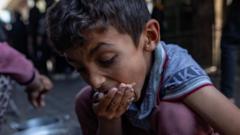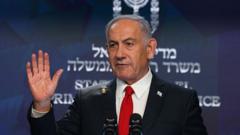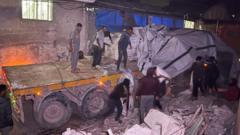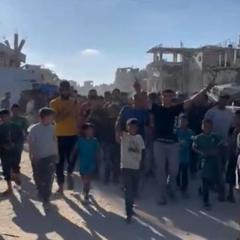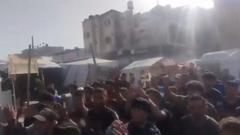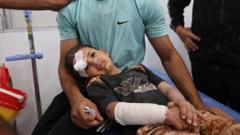Some Israeli defense officials privately warn that without the restoration of humanitarian aid, Gaza could face dire food shortages and possible starvation. This comes amid ongoing military objectives to combat Hamas, raising critical questions about the humanitarian implications of the blockade.
Israeli Military Acknowledges Imminent Starvation Risk in Gaza Amid Ongoing Blockade

Israeli Military Acknowledges Imminent Starvation Risk in Gaza Amid Ongoing Blockade
Internal Israeli assessments reveal concerns over widespread starvation in Gaza due to prolonged aid blockades, contradicting public statements from the government.
In a striking admission, several Israeli military officials have concluded that unless aid deliveries to Gaza are resumed within weeks, many residents face the threat of starvation, according to sources close to the situation. While the Israeli government has publicly minimized the risks posed by its blockade of essential goods, numerous humanitarian organizations, including the United Nations, have long warned of a potential famine in the region.
Privately, Israeli defense officials monitoring conditions in the enclave report that the blockade has severely hindered food availability, leading to fears that many areas could soon lack the necessary provisions for basic nutrition. They emphasize the urgent need for measures to be taken to reinstate humanitarian aid operations swiftly, as delays could exacerbate the risk of widespread hunger.
Despite acknowledging these concerns internally, Israeli Prime Minister Benjamin Netanyahu has reiterated the government's commitment to continue military actions designed to dismantle Hamas and bring back hostages. This comes at a time of heightened tensions, particularly following recent foreign visits, including one by President Trump, that underscore diverging views on security strategies in the region.
As the situation continues to evolve, the implications of Israel's approach to Gaza, particularly regarding civilian welfare amidst military objectives, are drawing increasing scrutiny both domestically and internationally.
Privately, Israeli defense officials monitoring conditions in the enclave report that the blockade has severely hindered food availability, leading to fears that many areas could soon lack the necessary provisions for basic nutrition. They emphasize the urgent need for measures to be taken to reinstate humanitarian aid operations swiftly, as delays could exacerbate the risk of widespread hunger.
Despite acknowledging these concerns internally, Israeli Prime Minister Benjamin Netanyahu has reiterated the government's commitment to continue military actions designed to dismantle Hamas and bring back hostages. This comes at a time of heightened tensions, particularly following recent foreign visits, including one by President Trump, that underscore diverging views on security strategies in the region.
As the situation continues to evolve, the implications of Israel's approach to Gaza, particularly regarding civilian welfare amidst military objectives, are drawing increasing scrutiny both domestically and internationally.



